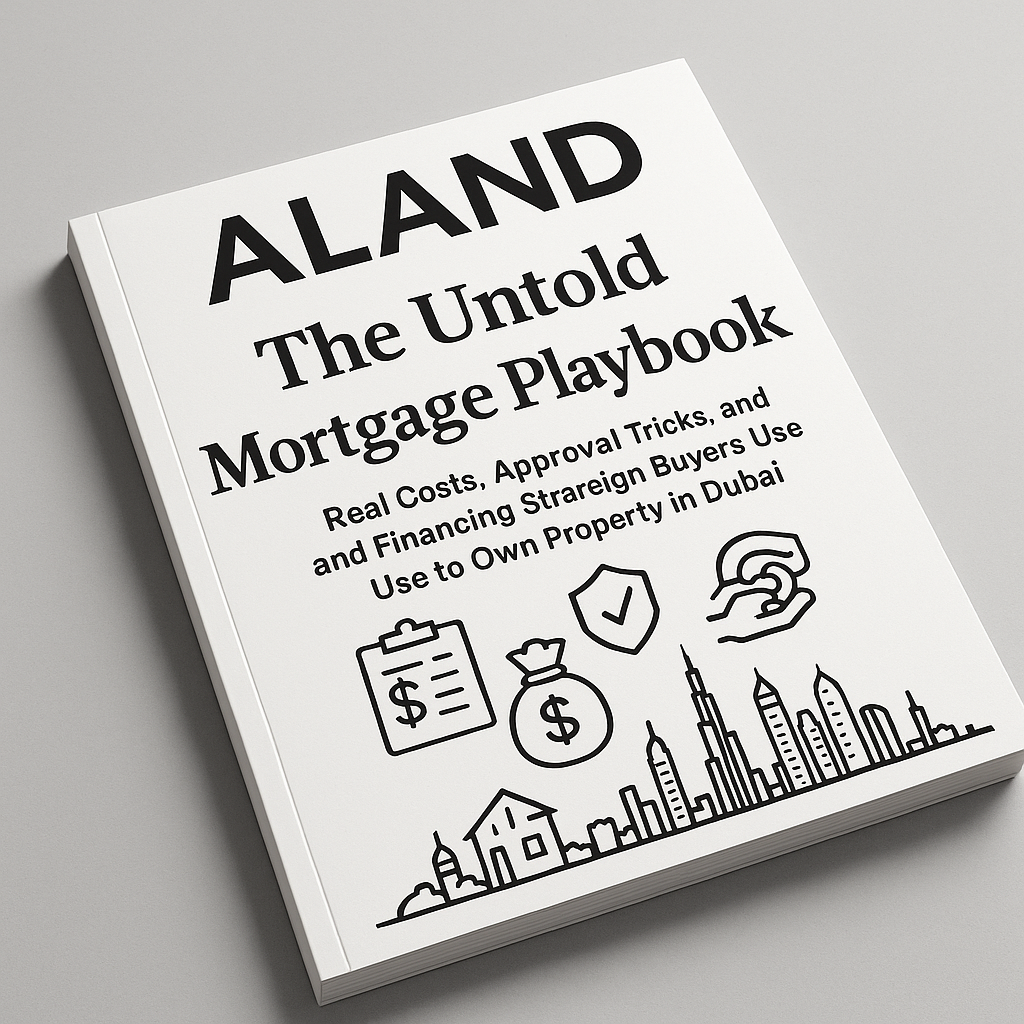The Untold Mortgage Playbook: Real Costs, Approval Tricks, and Financing Strategies Foreign Buyers Use to Own Property in Dubai
- Published Date: 29th Sep, 2025
-
4.9★ ★ ★ ★ ★(126)

By Dr. Pooyan Ghamari – Swiss Economist, Founder of the ALand Platform
Dubai’s property market is one of the strongest magnets for global capital today — a place where tax-free rental income, appreciation potential, and Golden Visa opportunities converge in a single investment. But there’s a side of the story that rarely gets told: buying property with a mortgage is far more complex — and more strategic — than most investors realize.
For foreign buyers, the process isn’t just about picking a bank and signing a loan. It’s about navigating hidden costs, understanding approval psychology, and structuring financing in ways that multiply returns instead of draining them. Those who play blindly pay more and own less. Those who master the playbook build property portfolios that grow wealth across cycles.
This is the insider’s guide most brokers won’t tell you — the real mechanics of Dubai mortgages, how foreign investors secure financing without residency, and the negotiation tactics that separate average deals from wealth-building ones.
The Real Cost of a Mortgage: Beyond the Interest Rate
Most buyers obsess over the interest rate. But the true cost of a mortgage comes from a web of fees and charges that can add 4%–7% to your total investment.
- Dubai Land Department (DLD) Fees – 4%Non-negotiable government tax. Developers sometimes cover part as an incentive.
- Mortgage Registration Fee – 0.25% of Loan AmountMandatory when registering your mortgage with the DLD.
- Property Valuation Fee – AED 2,500–3,500Loan is based on valuation, not purchase price. If valuation is lower, you pay the difference.
- Processing Fees – 0.5%–1% of Loan AmountCharged by banks to set up the loan. Negotiable in some cases.
- Life & Property Insurance – AED 1,000–5,000 annuallyRequired to protect the loan and the property.
- Trustee Fee – AED 4,000–5,000Paid to the office managing the ownership transfer.
Example: On a AED 2m property, extra costs can hit AED 120k–150k before your first payment. Smart investors budget for this upfront.
Approval Psychology: How Banks Actually Decide
Bank approval isn’t just math — it’s risk perception. UAE lenders apply Central Bank rules plus their own internal models.
-
Residency Status
-
Residents: up to 80% LTV, 25 years
-
Non-residents: 50%–70% LTV, 15–20 years
-
Golden Visa holders: often resident-level terms
-
-
Nationality & Home Country
-
Europeans & Americans → faster approvals
-
Indians & GCC nationals → favorable but with currency scrutiny
-
Iranians → strict limits due to sanctions
-
- Income SourceSalaried income is preferred. Self-employed need 2–3 years of audited accounts.
- Debt Burden Ratio (DBR)Your monthly debt cannot exceed 50% of your income. Go over, and rejection is automatic.
- Age & TenureMortgages must finish before age 65 (salaried) or 70 (self-employed).
💡 Insider tip: If borderline, banks often reduce loan amount or raise rates instead of rejecting outright. That’s your chance to negotiate with stronger documents or collateral.
Hidden Terms That Quietly Erode Returns
Even approved mortgages come with fine print:
-
Early Settlement Fees (1%) – If you sell or refinance early.
-
Variable vs. Fixed Rates – Fixed lasts 3–5 years, then often jumps.
-
Valuation Gaps – If bank values property lower, you cover the shortfall.
-
Currency Risk – FX swings on euro, GBP, or INR incomes can add huge long-term costs.
Financing Strategies Foreign Buyers Actually Use
Savvy investors flip the system to their advantage. Here’s how:
-
Show Offshore Income in Strong Currencies – USD/EUR/GBP income = better LTV and rates.
-
Secure Pre-Approval Early – Strengthens your hand with sellers and developers.
-
Leverage Golden Visa Status – Unlocks resident-level mortgage terms.
-
Mix Bank Mortgages with Developer Financing – Diversifies cash flow and portfolio growth.
-
Refinance Strategically – After 3–5 years, cut rates and extend tenure.
-
Negotiate Fees, Not Just Rates – Push for waived processing, free valuation, or reduced penalties.
The Developer Advantage: Financing Without Banks
Many investors skip banks entirely by using developer-backed plans:
-
50% during construction
-
50% over 3–5 years post-handover
-
Interest-free, no credit checks, no residency required
It’s technically not a mortgage, but works like one. Perfect for non-residents struggling with approvals.
The Negotiation Game: Tactics That Save Real Money
-
Leverage competition: Get multiple offers, play banks against each other.
-
Push for add-ons: Waived processing, reduced penalties.
-
Time your move: Lock rates when EIBOR is stable or falling.
-
Bundle services: Pair mortgages with business accounts to gain bargaining power.
Strategic Framework: Build Financing Into Your Wealth Plan
Mortgages should never be treated as mere transactions. Smart investors align financing with their long-term portfolio strategy:
-
Expand holdings with leverage instead of cash-heavy buys
-
Match mortgage terms to your horizon (flip vs. hold)
-
Plan for FX and offshore tax impact
-
Use property for residency, then refinance for better terms
Platforms like ALand are built around this — combining property sourcing, financing, legal structuring, and negotiation support into one ecosystem.
Final Thought
Mortgages in Dubai aren’t just loans — they’re wealth strategies. The winners aren’t those who accept whatever the bank offers, but those who master costs, approval psychology, and financing tactics to stretch their capital and compound wealth.
For investors who learn this untold playbook, Dubai becomes more than a property market — it becomes a global wealth hub where smart leverage builds enduring fortunes.
Dr. Pooyan Ghamari is a Swiss Economist, visionary strategist, and founder of the ALand Platform – a global hub for real estate intelligence, economic strategy, and cross-border investment solutions.

